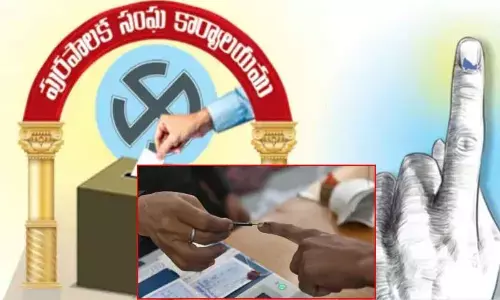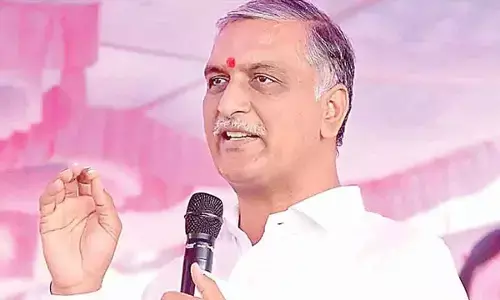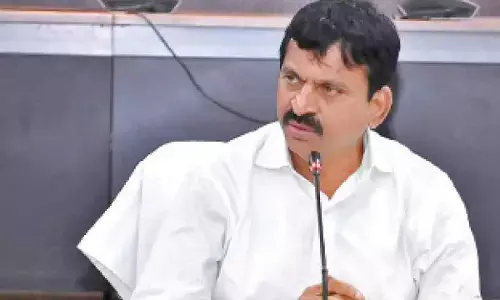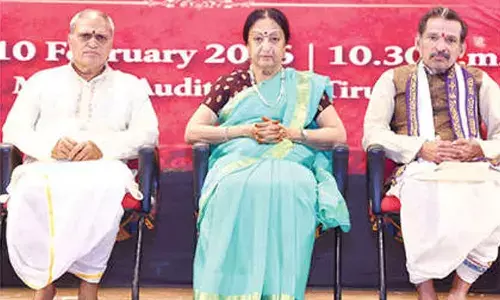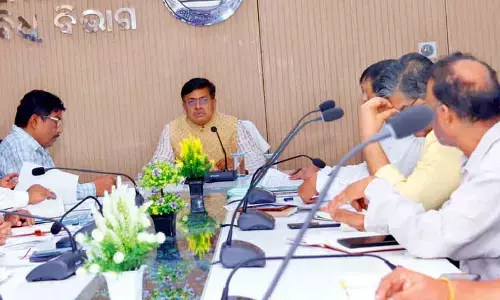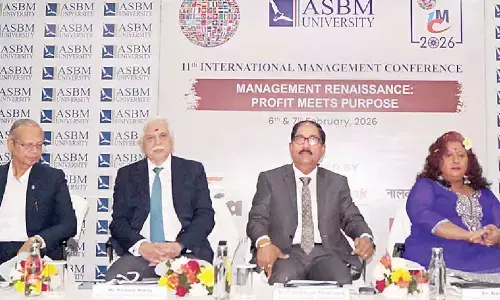The mission and vision of gurus
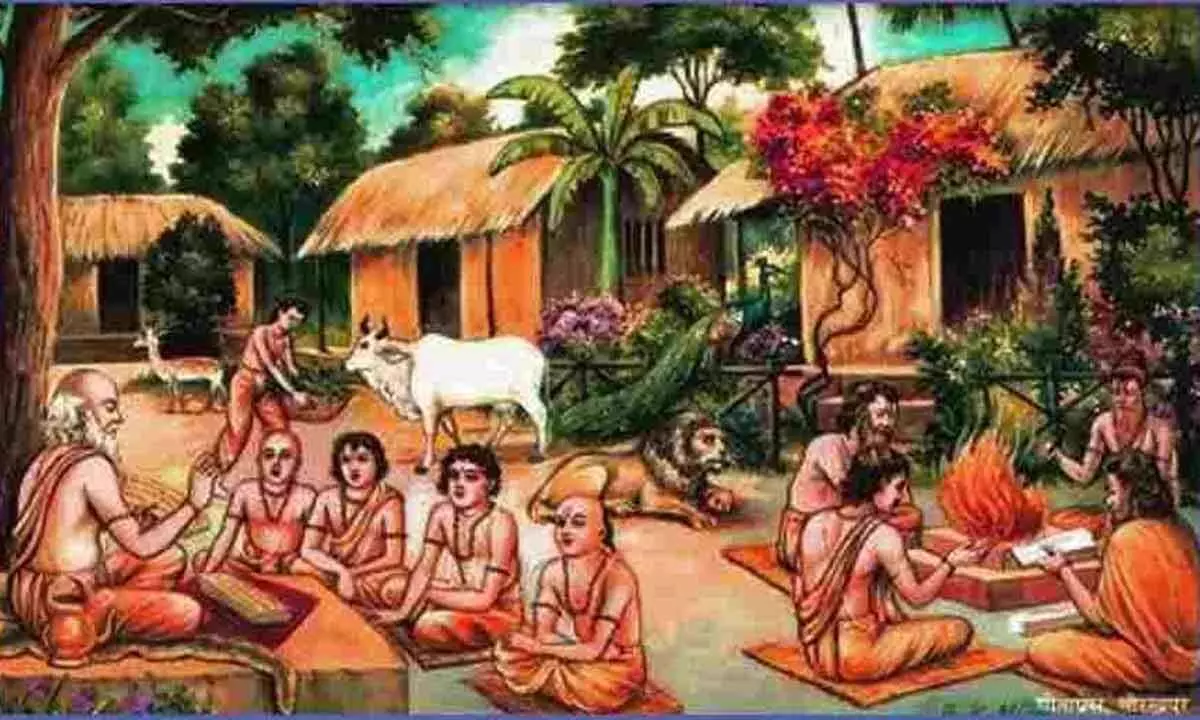
A Gurukul is a type of education system, that obtained in ancient India, with Shishyas, or students or disciples, residing in the Guru’s house, for a period of time, while they were educated. The Guru-Shishya Parampara, or “lineage”, denotes a succession of teachers, and disciples, in Indian-origin religions such as Hinduism, Jainism, Sikhism and Buddhism. It is considered that this relationship, based on the genuineness of the Guru, and the respect, commitment, devotion and obedience of the student, is the best way for subtle or advanced knowledge to be conveyed. The student eventually masters the knowledge that the Guru embodies
A very useful, and remarkably effective, tool of learning is the ‘teach yourself’ variety. While preparing for Civil Services Examinations, I remember supplementing what my father taught me in Political Science and Political Thought, with extremely valuable material from a book called ‘Teach Yourself Political Thought’ by Professor C L Wayper, an English Language Book Series publication.
Another method of education that has become very popular, and is very convenient, is that of distance learning. Among the universities that use this method is the Indira Gandhi National Open University (IGNOU), the premier institution in the country for this approach. There was, in fact, no substitute for online teaching during the lockdown period following the emergence of the COVID-19 virus. Clearly distance teaching/learning has its plus points. Those who believe in the orthodox and classical method of pedagogy, however, maintain that the eye contact that is possible in a physical teaching class has no substitute.
Much emphasis is being laid, all over the world, upon adult, or continuing, education. Mature men and women, who were denied the advantage of formal education through institutions, gain new forms of knowledge, skills, attitudes or values, through the process. Such education is imparted through many methods, such as study circles, colloquia, seminars or workshops, residential conferences or meetings, in addition to full, or part-time, classes or courses, in which teachers have a formal role.
With the objective of furthering the cause of effective adult education, a development organisation known as ‘Each One Teach One Charitable Foundation’ (EOTO Foundation), was founded in 1983. That programme has served as a model for the ‘Diksha’ or ‘Digital Infrastructure for Knowledge, Sharing’ programme, of the National Council of Educational Research and Training (NCERT) in India.
The Government of India has decided that adult education will now be known as ‘Education for All’. It will be a part of the umbrella centrally sponsored scheme, Understanding Lifelong Learning for All in Society (‘ULLAS’). It has been the custom from times immemorial, practiced even today, for grateful pupils, to offer, what is known as ‘Gurudakshina’, to their mentors, as a token of gratitude.
The great Greek philosopher, Aristotle was the Guru of Alexander the Great, the conqueror of the world. The story, probably apocryphal, goes that, upon returning from his conquests, Alexander offered ‘Gurudakshina’ to Aristotle, who asked Alexander to get him five things from India. They were the soil and the waters of the Ganges, apart from the scripts of some of the Hindu epics. The story goes on to add that, before making those requests, Aristotle asked Alexander to move away, as he was standing in the way of the sunshine, in which the Guru was basking!
A rather gruesome incident, related in the great epic Mahabharat, is that of the great Guru Dronacharya, demanding that his disciple, Eklavya, cut off his right thumb, and gave it to him as Gurudakhina, as Dronacharya wished to spare his favourite disciple, Arjun, from a possible, and, in all likelihood, losing confrontation with Eklavya.
There is a progressive farmer, Jagadeesh Reddy, in Chittoor town of Andhra Pradesh state, who specialises in natural farming. His approach and technology have attracted the attention of farmers, scientists, administrators and political leaders across the country. He was even invited, recently, to deliver a talk on the TEDx platform. And, most interestingly, he has just returned from Guwahati, where he took lessons, to senior agriculture teachers, to sensitise them about his methods. Gurus need not, apparently, be all from the academic community!
It is not uncommon for two individuals to become Gurus for each other. General N C Vij, who was the Chief of Army Staff of the country during the Kargil war, and is known for many heroic deeds while in service, was the Vice-Chairman of the National Disaster Management Authority (NDMA) when I was a Member of that organisation. I was a novice, so far as military matters were concerned, and he had little knowledge of how the civil administration worked. By the time we finished our five-year tenure in NDMA, each of us had become a near expert, in the other’s field, through constant exchanges.
A Gurukul is a type of education system, that obtained in ancient India, with Shishyas, or students or disciples, residing in the Guru’s house, for a period of time, while they were educated. The Guru-Shishya Parampara, or “lineage”, denotes a succession of teachers, and disciples, in Indian-origin religions such as Hinduism, Jainism, Sikhism and Buddhism. It is considered that this relationship, based on the genuineness of the Guru, and the respect, commitment, devotion and obedience of the student, is the best way for subtle or advanced knowledge to be conveyed. The student eventually masters the knowledge that the Guru embodies.
In the early oral traditions of the Upanishads, the Guru-Shishya relationship had evolved into a fundamental component of Hinduism. The term “Upanishad” derives from the Sanskrit words “upa” (near), “ni” (down) and “ṣad”” (to sit) - so it means “sitting down near” a spiritual teacher to receive instruction.
Education comes from the Latin ‘educate’, meaning ‘to draw out’ the pupil. That is to say, true education is less about what you put into the student, and more about what you draw out of them.
Dayananda Saraswati, the founder of Arya Samaj and Swami Shraddhanand, the pioneer of the modern Gurukul system, founded, in 1886, the now-widespread Dayanand Anglo-Vedic (DAV) Public Schools and Universities.
The Ministry of Culture, of the government of India, runs a scheme called the “Guru Shishya Parampara Scheme” through Zonal Cultural Centres to preserve and promote rare and vanishing Classical or Folk/Tribal art forms, so that the young talents be nurtured, to acquire skills, in their chosen field of art, under the able guidance of Gurus.
Various Gurukulas still exist in India, and researchers have been studying, the effectiveness of the system, through those institutions. With the advent of new means of mass communication, many Gurus, and Vedantic Scholars, are opening E-Gurukuls. These Gurukuls are operating online, and are now imparting knowledge, about different Hindu scriptures using the internet.
Gurukul Takshshila is the best gurukul in India that is encircled by woods and verdant pastures. This fosters a calm and suitable environment for the peoples to absorb information. The environment is calm and caring, which satisfies social, emotional, and intellectual needs.
The field of management has also seen many great Gurus, the most well-known among them being Peter Drucker. He was an Austrian American management consultant, educator, and author, whose writings contributed to the philosophical, and practical, foundations of modern management theory.
On a lighter note, and before we close this discussion, one recalls a famous English political philosopher, in his autobiography, ending one chapter with the heading, ‘End of School’, and beginning the next one with the heading ‘Beginning of Education!’
(The writer is formerly Chief Secretary, Government of Andhra Pradesh)



